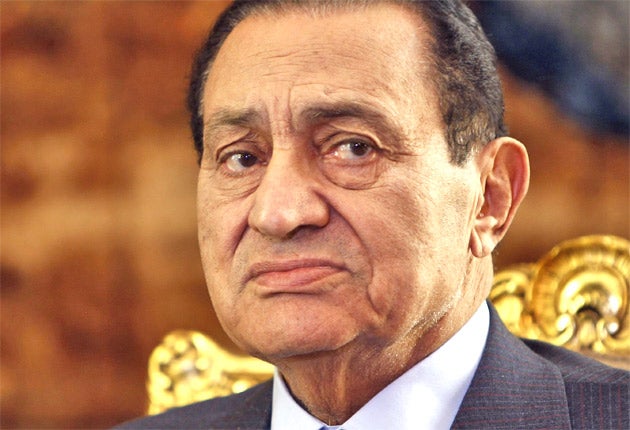The final indignity: ailing Mubarak is detained

At the height of the Egyptian uprising, when the crowds in central Cairo were hanging effigies of their president in Tahrir Square, a defiant Hosni Mubarak declared: "I will not leave Egypt or depart it until I am buried in the ground."
After Egypt's prosecutor general yesterday ordered that the deposed president be detained for 15 days pending charges of corruption, Mr Mubarak may be wishing he had fled his former dominion while he still had the chance.
The man who ruled his country with an iron fist for three decades is now being held and questioned over alleged abuses of power during his rule and over the deaths of protesters.
Mr Mubarak's sons, Gamal and Alaa, have also been detained over allegations of corruption. They are being held in a prison near Cairo after being whisked away in a police van from the family home in Sharm el Sheikh under a hail of stones and bottles from angry onlookers. Mr Mubarak's whereabouts are unknown but, according to state television, all three will appear for questioning in a Cairo court on Tuesday.
News of his detention, coming after a weekend of bloody clashes between the army and pro-democracy demonstrators, was warmly welcomed by Egyptian activists. The blogger Wael Khalil said the move was "a step forward" and that "the revolution cannot now be turned back". "The people are calling the shots. They are dismantling the regime piece by piece and the army is their instrument for doing that," he added.
The week leading up to yesterday's announcement had been marred by violent confrontations around Tahrir Square in central Cairo. A large rally on Friday – aimed at putting pressure on the ruling military council to speed-up the prosecution of former officials – descended into violence when the army fired bullets and tear gas to clear activists who had defied the 2am Saturday curfew. At least one person was shot dead during the clashes.
But on Sunday, the prosecutor general ordered that Mr Mubarak be questioned on a range of charges, including the alleged orchestration of violence during the 18 days leading up to his ousting. He reportedly suffered a heart attack while being questioned on Tuesday night, but doctors have now confirmed he is healthy enough for prosecutors to continue their probe.
Many believe the decision to detain Mr Mubarak is no coincidence as it comes on the heels of mounting criticism of the army's performance in government. Mohamed Fouad Gadalla, a judge and vice-president of Egypt's State Council, said he believed the ruling military council pressured the public prosecutor to pursue Mr Mubarak and his family. "The army are doing this now because if they don't take any strong action against Hosni Mubarak, then the people will march to Tahrir Square again," he said.
Though no prosecutions have yet been completed, the detention of Mr Mubarak has come as a shock in a region where heads of state are not used to being brought to heel. "It's rare," said Jane Kinninmont, a Middle East expert from Chatham House. "I suppose the only similar recent example is Saddam Hussein... [Mubarak] was always taking a risk by remaining in Egypt."
Join our commenting forum
Join thought-provoking conversations, follow other Independent readers and see their replies
Comments
Bookmark popover
Removed from bookmarks